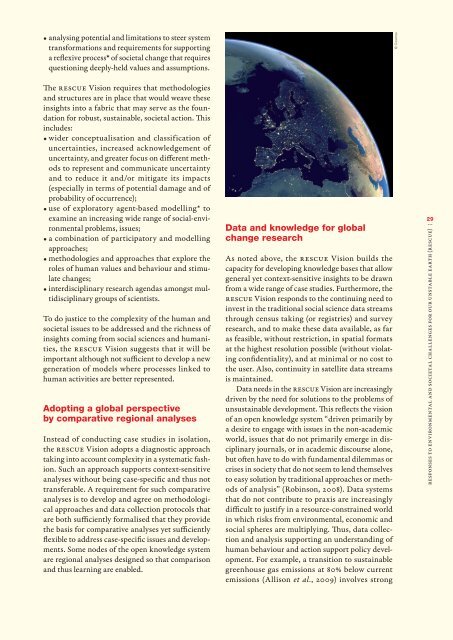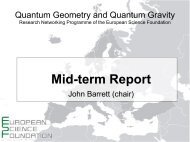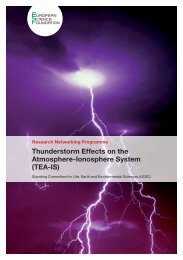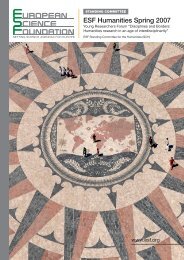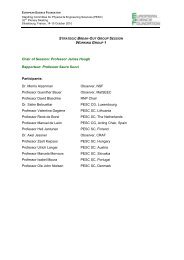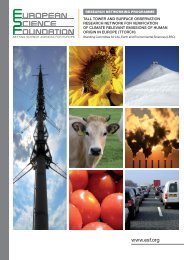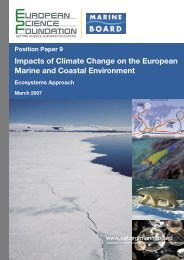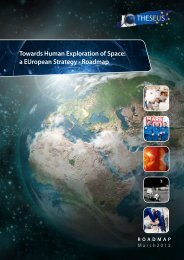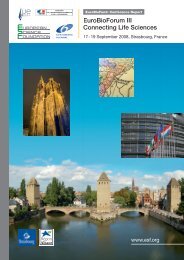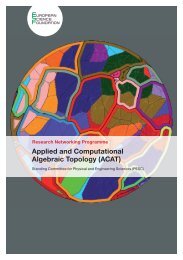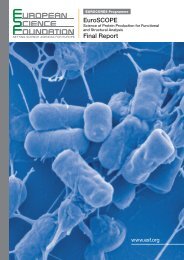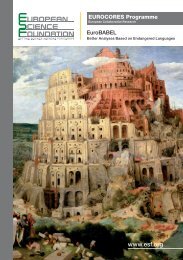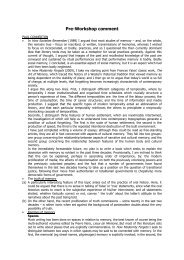Synthesis Report - European Science Foundation
Synthesis Report - European Science Foundation
Synthesis Report - European Science Foundation
Create successful ePaper yourself
Turn your PDF publications into a flip-book with our unique Google optimized e-Paper software.
• analysing potential and limitations to steer systemtransformations and requirements for supportinga reflexive process* of societal change that requiresquestioning deeply-held values and assumptions.© CosmosThe RESCUE Vision requires that methodologiesand structures are in place that would weave theseinsights into a fabric that may serve as the foundationfor robust, sustainable, societal action. Thisincludes:• wider conceptualisation and classification ofuncertainties, increased acknowledgement ofuncertainty, and greater focus on different methodsto represent and communicate uncertaintyand to reduce it and/or mitigate its impacts(especially in terms of potential damage and ofprobability of occurrence);• use of exploratory agent-based modelling* toexamine an increasing wide range of social-environmentalproblems, issues;• a combination of participatory and modellingapproaches;• methodologies and approaches that explore theroles of human values and behaviour and stimulatechanges;• interdisciplinary research agendas amongst multidisciplinarygroups of scientists.To do justice to the complexity of the human andsocietal issues to be addressed and the richness ofinsights coming from social sciences and humanities,the RESCUE Vision suggests that it will beimportant although not sufficient to develop a newgeneration of models where processes linked tohuman activities are better represented.Adopting a global perspectiveby comparative regional analysesInstead of conducting case studies in isolation,the RESCUE Vision adopts a diagnostic approachtaking into account complexity in a systematic fashion.Such an approach supports context-sensitiveanalyses without being case-specific and thus nottransferable. A requirement for such comparativeanalyses is to develop and agree on methodologicalapproaches and data collection protocols thatare both sufficiently formalised that they providethe basis for comparative analyses yet sufficientlyflexible to address case-specific issues and developments.Some nodes of the open knowledge systemare regional analyses designed so that comparisonand thus learning are enabled.Data and knowledge for globalchange researchAs noted above, the RESCUE Vision builds thecapacity for developing knowledge bases that allowgeneral yet context-sensitive insights to be drawnfrom a wide range of case studies. Furthermore, theRESCUE Vision responds to the continuing need toinvest in the traditional social science data streamsthrough census taking (or registries) and surveyresearch, and to make these data available, as faras feasible, without restriction, in spatial formatsat the highest resolution possible (without violatingconfidentiality), and at minimal or no cost tothe user. Also, continuity in satellite data streamsis maintained.Data needs in the RESCUE Vision are increasinglydriven by the need for solutions to the problems ofunsustainable development. This reflects the visionof an open knowledge system “driven primarily bya desire to engage with issues in the non-academicworld, issues that do not primarily emerge in disciplinaryjournals, or in academic discourse alone,but often have to do with fundamental dilemmas orcrises in society that do not seem to lend themselvesto easy solution by traditional approaches or methodsof analysis” (Robinson, 2008). Data systemsthat do not contribute to praxis are increasinglydifficult to justify in a resource-constrained worldin which risks from environmental, economic andsocial spheres are multiplying. Thus, data collectionand analysis supporting an understanding ofhuman behaviour and action support policy development.For example, a transition to sustainablegreenhouse gas emissions at 80% below currentemissions (Allison et al., 2009) involves strong29Responses to Environmental and Societal Challenges for our Unstable Earth (RESCUE)


